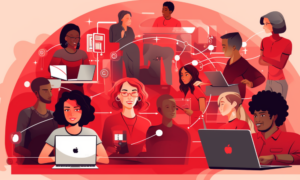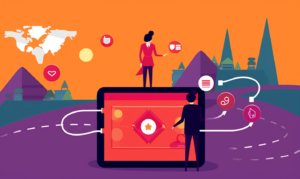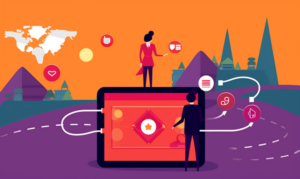Improving hiring and retainment through A.I.
- 5 Min Read
In a bid to ease the process of hiring & retaining talent, advancements in HR technology have made acquisition strategies more streamlined and efficient.
- Author: Richard Justenhoven
- Date published: Sep 23, 2019
- Categories

AI. can mitigate bias and enable valid and reliable predictions. And it’s legally defensible – because it’s explainable. As every good hiring decision should be. Richard Justenhoven, product development director, Aon’s Assessment Solutions, ponders how A.I. is changing the talent management market.
There’s an easy way to take the mystery out of Artificial Intelligence (AI) – just compare it to managing household chores.
In any home, floors need to be cleaned, clothes and dishes need to be washed. These can be done manually, but a machine will do them far more efficiently – but only if the right machine is used.
AI in our analogy is the dishwasher or the washing machine where each have programmes to get the job done very quickly and very well. Importantly though, managing them is still entirely a human process. So if a human puts clothes into a dishwasher or a glass into a washing machine, the results will not be good.
And it’s the same with an AI algorithm. Currently, they cannot be swapped; they’re built for a specific cause and they’re narrow. They can’t transfer abilities like a human can.
So an organisational algorithm, for example, can be used to find the best people for a specific role, but the same one couldn’t detect a perfect customer or even another person for a different role.
AI in its simplest term is a way to get something done, a replacement of a traditional method. But it won’t make something better by itself; it needs a clear framework from a human. So take note, if an organisation has been heading in the wrong direction, for example, with candidate assessments before, it’ll make bigger and faster mistakes with AI.
Indeed, according to Aon’s most recent Global Risk Management Survey, finding, hiring and retaining employees with the right skills is one of the most critical challenges companies say they face. At the same time, there are three areas of opportunity for HR leaders:
One, an organisation’s greatest weapon – a great workforce – is at risk. HR leaders need to cultivate a digitally ready workforce. Two, Intellectual Property is at risk. Can the current talent strategy keep up with rapid technological advancement? And three, the ability to compete is at risk. Is the business driving towards growth and enabling transformation?
Yet today’s people management issues are greatly hindered by organisations not knowing what skills or capabilities will be needed tomorrow, let alone job roles that will exist in 5 years.It means that assessing and identifying talent with key capabilities will be more important than ever before and assessments that incorporate artificial intelligence (AI) will help identify and select candidates who are likely to be successful—giving a company competitive edge.
Success in this digital era will depend on organisations being able to attract, retain and motivate the right people with the right digital competencies.
Resilience, adaptability, flexibility and curiosity will be the keys to building an agile, digitally ready workforce. Leading companies are focusing on assessing these digital competencies; they look for people with a learning mindset focused on growth and positivity toward constant change.
There are five ways AI improves talent assessment:
- Model future scenarios: AI helps model future scenarios, then designs development paths that allow people to perform in the jobs of the future that cannot yet clearly be defined. With sufficient runway, employees whose jobs will be automated or changed can be retrained and become an internal talent supply.
- Rethink talent models: AI-driven assessments help identify the core capabilities that drive growth and find candidates with those behaviours. Understanding what skills and behaviours create value is important. While technical skills are essential, nontechnical traits—like curiosity or adaptability—are vital for the digital age. This is because technical skills can be trained, but only to people who want and have the aptitude to learn and change.
- Increase HR Efficiency: AI offers HR the opportunity to automate routine transactions and manual tasks—many of which are administrative or repetitive processes. Automating steps in the recruitment process can free up hiring managers’ time for more complex projects.
- Create Actionable Insights: Organisations have an abundance of data about employees and prospective new hires. AI excels at classifying data and identifying specific behaviour patterns. Using algorithms and machine learning, AI can create actionable insights or interpret implications relevant to talent strategy.
- Fair processes: AI can understand how a human would assess a candidate and replicate the same process. This validity in selection allows for an efficient and bias-free assessment process. AI’s ability to accurately and efficiently analyse unstructured data is at the heart of the future of talent assessment.
The companies that will thrive during the Fourth Industrial Revolution will be those that:
- Effectively identify the digital competencies needed to compete in a changing global economy.
- Maximise the potential of both the people who want to work with them and the people who already do.
Building a responsive, agile 21st-century workforce is not just about the technical skills of the people hired in the short term. It’s about creating a strong, unique workplace culture that puts people at its centre.
Identifying the digital competencies employees need, creating candidate-centric recruitment and assessment processes to identify best-fit candidates and upskilling and reskilling rather than just hiring and firing to build a digitally ready workforce will all play critical roles in this transformation.
The challenges companies face in making this transition are urgent, but those that embrace them today will be better positioned to create a workforce that can thrive in the digital age.








